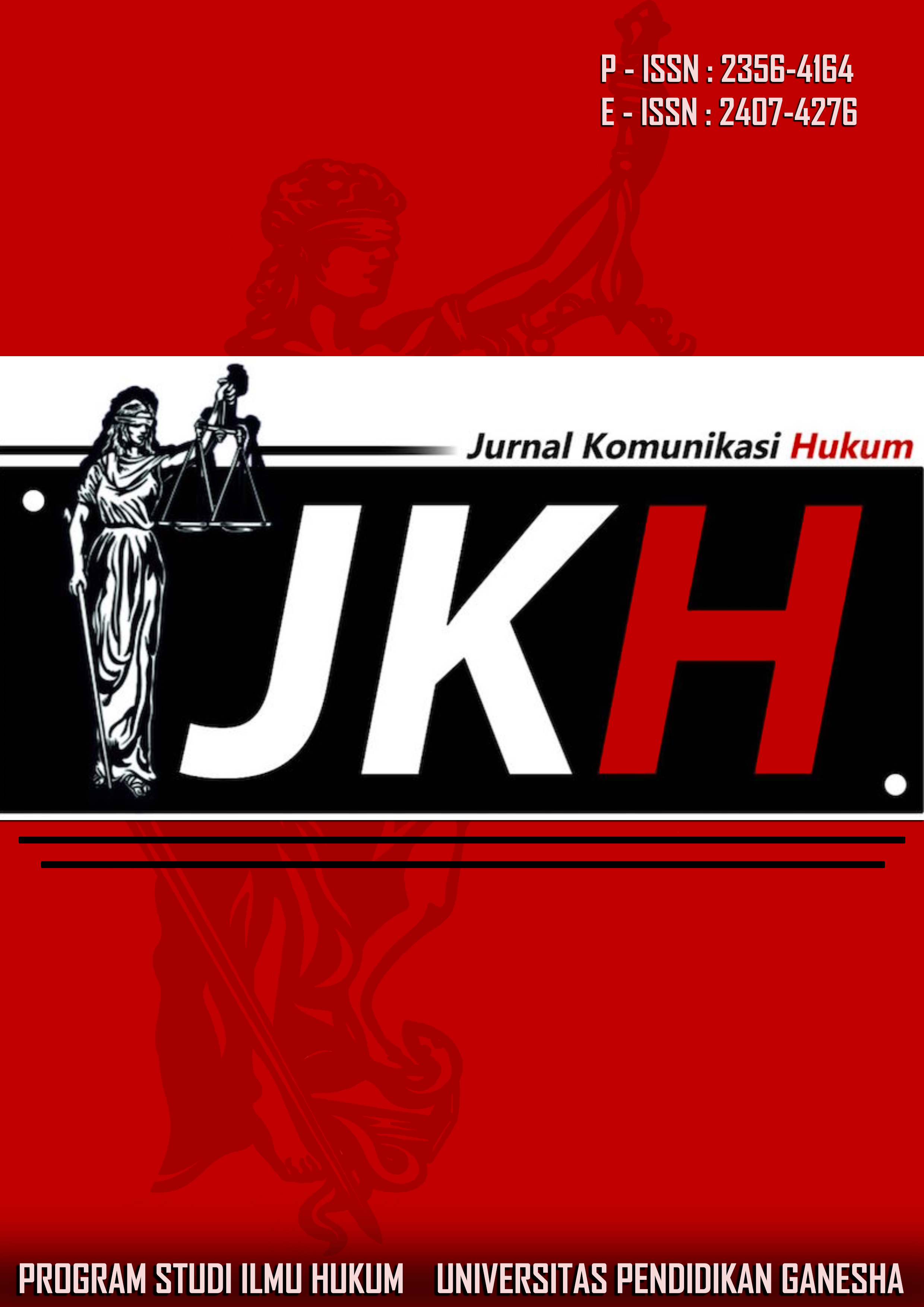PROBLEMATIKA DALAM PELAKSANAAN DAN PENEGAKAN HUKUM PASAL-PASAL POLIGAMI DALAM MASYARAKAT ADAT BALI
DOI:
https://doi.org/10.23887/jkh.v5i1.16749Abstract
Poligami adalah salah satu bentuk kekerasan terhadap perempuan. Secara yuridis, sudah ada peraturan yang mengatur prosedur poligami, yaitu Undang-undang Nomor 1 Tahun 1974 tentang Perkawinan beserta peraturan pelaksanaannya, yaitu Peraturan Pemerintah Nomor 9 Tahun 1975. Peraturan tersebut berlaku bagi seluruh warga negara Indonesia, termasuk masyarakat adat Bali (etnis Bali-Hindu). Pada prinsipnya, peraturan-peraturan tersebut membolehkan poligami tetapi dengan prosedur yang ketat sehingga dapat digunakan oleh seorang istri untuk mencegah suaminya berpoligami. Dalam kenyataannya, pelaksanaan dan penegakan peraturan-peraturan tersebut tidak efektif mencegah terjadinya kekerasan terhadap perempuan akibat dipoligami. Tulisan ini bertujuan mengungkapkan problematik-problematik yang terjadi dalam pelaksanaan dan penegakan ketentuan-ketentuan poligami bagi masyarakat adat di Bali. Metode yang digunakan untuk mengkaji permasalahan adalah metode penelitian kepustakaan yang dalam studi hukum disebut metode penelitian hukum normatif, dengan mengandalkan penggunaan data sekunder berupa bahan hukum (primer dan sekunder) dan bahan non-hukum. Hasil penelitian menunjukkan bahwa tidak efektifnya ketentuan-ketentuan poligami dalam Undang-undang Perkawinan dan peraturan pelaksanaannya untuk mencegah terjadinya poligami disebabkan masih adanya problematik pada sistem hukumnya, baik pada komponen substansi hukumnya, struktur hukumnya dan budaya hukumnya.
Kata kunci: penegakan hukum, poligami, kekerasan terhadap perempuan.
Downloads
Published
How to Cite
Issue
Section
License
Authors who publish with this journal agree to the following terms:- Authors retain copyright and grant the journal right of first publication with the work simultaneously licensed under a Creative Commons Attribution License that allows others to share the work with an acknowledgement of the work's authorship and initial publication in this journal.
- Authors are able to enter into separate, additional contractual arrangements for the non-exclusive distribution of the journal's published version of the work (e.g., post it to an institutional repository or publish it in a book), with an acknowledgement of its initial publication in this journal.
- Authors are permitted and encouraged to post their work online (e.g., in institutional repositories or on their website) prior to and during the submission process, as it can lead to productive exchanges, as well as earlier and greater citation of published work (See The Effect of Open Access).
Authors who publish with this journal agree to the following terms:
- Authors retain copyright and grant the journal right of first publication, with the work [SPECIFY PERIOD OF TIME] after publication simultaneously licensed under aCreative Commons Attribution License that allows others to share the work with an acknowledgement of the work's authorship and initial publication in this journal.
- Authors are able to enter into separate, additional contractual arrangements for the non-exclusive distribution of the journal's published version of the work (e.g., post it to an institutional repository or publish it in a book), with an acknowledgement of its initial publication in this journal.
- Authors are permitted and encouraged to post their work online (e.g., in institutional repositories or on their website) prior to and during the submission process, as it can lead to productive exchanges, as well as earlier and greater citation of published work (See The Effect of Open Access).












